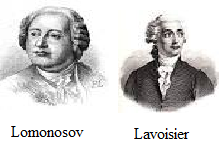Science > Chemistry > Empirical and Molecular Formulae of Compounds In this article we shall study the concept of empirical formula and molecular formula of Compound. Empirical Formula: The empirical formula of a substance represents the simplest relative whole number ratio of the atoms of each element contained in the molecule of the substance. Example: […]
Category: Chemistry

Science > Chemistry > Laws of Chemical Combinations > Law of Multiple Proportions In the previous article, we have studied the law of definite proportions. In this article, we shall study the law of multiple proportions. The law of multiple proportions was given by British scientist John Dalton in 1803. Statement: When two elements combine […]

Science > Chemistry > Laws of Chemical Combinations > Law of Definite Proportions In the last article, we have studied the law of conservation of mass. In this article, we shall study the law of definite proportions. The law of definite proportions was given by French chemist Joseph Proust in 1799. The law of definite […]

Science > Chemistry > Laws of Chemical Combinations > Law of Conservation of Mass In last article, we have studied Dalton’s atomic theory. In this article, we shall study the law of conservation of mass. The law of conservation of mass was given by Russian scientist Lomonosov in 1765 and French Scientist Antoine Lavoisier in […]
Dalton’s Atomic Theory

Science > Chemistry > Laws of Chemical Combinations > Dalton’s Atomic Theory In this article, we shall study the meaning of physical changes and chemical changes, and the very important concept of chemistry known as dalton’s atomic theory which became a stepping stone in the development of chemistry. Physical Changes and Chemical Changes: Physical Changes: […]

Science > Chemistry > Introduction to Chemistry > Methods of Separation of Mixtures In the last article, we have studied the chemical classification of substances. Most of the available substances in nature are in mixture form. The useful component of the mixture can be obtained by separating individual components of the mixture by a suitable […]

Science > Chemistry > Introduction to Chemistry > Chemical Classification of Substances In the last article, we have studied the significance of chemistry and its branches. In this article, we shall study the chemical classification of substances. Matter and its Different States: The matter is any substances that have mass and that occupies space. There […]

Science > Chemistry > Introduction to Chemistry > Significance of the Study of Chemistry In this article, we shall study the meaning of chemistry and its different branches. What is Chemistry? Science word is derived from the Latin word ‘Scientia’ which means ‘to know’. Science has many disciplines, Chemistry is one of them. It is the […]
Science > Chemistry > Halogen Derivatives of Alkanes > Nomenclature of Alkyl Halides In this article, we shall study isomerism in alkyl halides and their nomenclature. Isomerism in Haloalkanes: Isomers are the organic compounds, which have the same molecular formula but different structural formula and properties. The phenomenon is called isomerism. Haloalkanes can exhibit the following […]

Science > Chemistry > Organic Chemistry > Halogen Derivatives of Alkanes > Introduction In this article, we shall study halogen derivatives of alkanes or haloalkanes. Organic Compounds Containing Halogens: If one or more hydrogen atom is replaced in hydrocarbon by an equivalent number of halogen, the compounds obtained are called halogen derivatives of hydrocarbons. Halogen […]